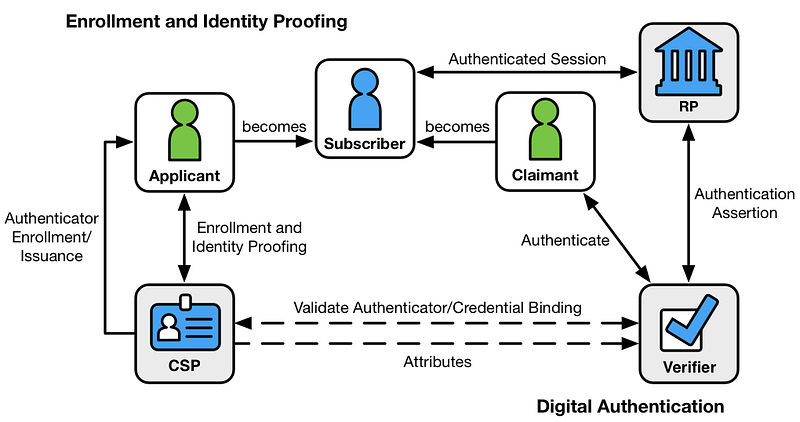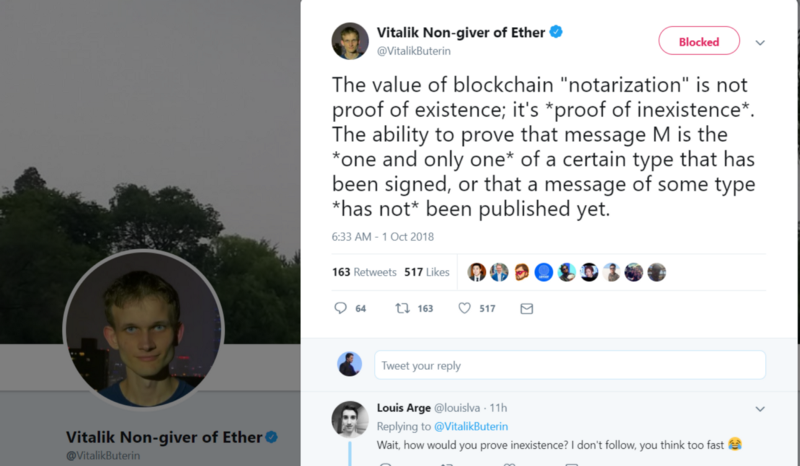I was forwarded one of the most ignorant concepts of what Bitcoin (and for that matter Blockchain) is about earlier today. This would be a part of the problems that are associated with the false idea that Code is law or that Code can ever be law.

I was forward the following statement from Vitalik Buterin to comment on:
“The value of blockchain “notarization” is not proof of existence; it’s *proof of inexistence*. The ability to prove that message M is the *one and only one* of a certain type that has been signed, or that a message of some type *has not* been published yet”.
I am sorry to tell you that the only thing a notarisation does is to offer evidence of existence. Not proof, evidence. As some may remember with MD5 and a tool named Stripwire, the integrity of a hash can also be called into question.

Vitalik goes on to state what he believes a Blockchain to be. He claims,
The ability to prove that message M is the *one and only one* of a certain type that has been signed, or that a message of some type *has not* been published yet
We now have a logical condition that Mr Buterin states to be our predicate to be evaluated.
A OR B is true.
For A, we have the claim:
The ability to prove that message M is the *one and only one* of a certain type that has been signed
For B, we have the additional state in claim of:
that a message of some type *has not* been published yet
So, as this is a logical OR condition, to prove Mr Buterin wrong, we need show that each claim is independently wrong.
Claim A
The ability to prove that message M is the *one and only one* of a certain type that has been signed
Let us start with a message M. M is a certain type of message. Let us say, for simplicity, there are two options. M signs a message saying X or M signs a message saying Y. M could be a contract offer.
We want to show definitively that The signed contract is not the only one available on a Blockchain. That is, M~X and M~Y cannot both exist.
In fact, there are ways to have a version of M~X and M~Y co-exist.
The simplest means comes from the collusion of the parties to a contract. Party A signs both X and Y to B, and now can choose the particular path they wish to prove “always existed”. In effect, we could have two sets of books. A block chain does not stop this and it is the adducing of other extrinsic evidence in support of the ledger and system used by the parties that leads to a court selecting from the two options.
Now, there are ways for parties to construct contracts that increase the amount of evidentiary weight associated with the assertion that only X or Y was signed for M. But, this is not a proof of only X or Y. It is a claim in law of evidence. Not proof.
We can have a version of M~X and M~Y signed on a single blockchain and, as H(M~X) does not allow you to see H(M~Y), you cannot tell that both are signed and available. Further, if we look at a case of accounting fraud, such as that with Enron, the existence of these signed messages would not have allowed for the detection of the fraud in Enron.
Enron used a series of false and/or complicit companies. The records were all technically correct. The books, at a level of what the Blockchain sees and uses would have been completely correct and if Enron used a Blockchain, the accounting records would not be any different.
This is a problem not of immutability, but one of fraud. The records used by Enron where not altered to create the fraud, they where “cooked” and no Blockchain stops this. This remains a reason for vigilance and a reason why companies need to be audited. No blockchain stops fake invoices, nor embezzlement not any of the main accounting frauds we see in modern companies.
That was never the purpose of Bitcoin and no blockchain stops this. The use of CaaTs (computer aided audit technologies) can make auditing simpler using the blockchain, but it does not remove the need for auditors to check and detect fraud.
I could for example have constructed two sets of Books on a blockchain. One has the real sales or a part of those and the fraudulent ones, and another has a separate set of transactions. A public key does not equal identity. It is not a means to
Mostly, the foolishly small minded idea of non-repudiation that so many “coders” and “cryptographers” tout is not something that is valid in law. I can always repudiate a transaction. The perfect code and cryptographic system does not preclude me from simply stating I was under duress or the key was stolen.
More, in order to have any level of privacy, keys are not used for the entirety of a transaction path. In Bitcoin and any derivative Blockchain, you send from one key to another and a wallet collects a large number of public — private key pairs as addresses over time. So, signed with which address?
there is no way to prove ownership of all possible addresses a user has controlled. There is only the ability to have a set of addresses that are attributed to a user and then to adduce evidence (from external sources) that a particular user had control of a particular key.
So, again, it comes to external information. The only manner to allow proof of the keys and control is registration of an address, something like PKI or a registration body. Here, the address to be used would be registered to the party in advance of the signing of the evidence of the existence of the message M. Here, it is not the Blockchain that is providing the evidence, but the PKI or registration body. Bitcoin is thus only a more resilient and cheaper escrow and notary service and the existence of the blockchain is not what provides “proof”. The evidence comes from the certification body.
Consequently, we see that claim A is false.
Permission-less as it is touted is a fallacy
A part of this is a false belief that any item in the “real” world can be “permission-less”. This is a misguided and childlike belief. In the physical world, the ownership of a good or property is not the same as a right or claim to a good or property. This applies to both real property, physical goods and chattels as well as intellectual property and digital goods.

If you have a token stating a right to a chattel good (such as a car for example), then, this is a right and not the actual ownership itself. You could sell the token and then have the chattel goods assigned by a court. For instance. You buy a car. This car has a registration token. This token can even be recognised as an official registration token (right now, all ownership is in effect a database token — just these are outside a blockchain).
It does not matter that your “ownership token” states that you own the car, if the court states that a separate party owns it, you do not.
The fallacy of decentralisation of everything is again a pseudo religious claim without merit.
There are many cases of goods being assigned by a court. In fact, this is one of the main aspects of what a civil court does, they assign rights. So, if you have a token that does not allow this, the answer is for the court to simply hold the party not willing to transfer the token in contempt, or worse, to hold that the token itself is not valid.
Claim B
that a message of some type *has not* been published yet
You cannot prove this claim either. At its simplest,
- At time t=(0), we create a hash X=(M || I). Here, I is a value that is not known publicly.
- At a later time t=(T), we create a second hash Y=(M).
Both hashed messages are published on the blockchain.
You cannot prove M existed at t=0 from the message provided at time t=(T) alone. There is no way to know X given Y. If (I) is a 4096 bit random value that is appended to the message M (we concatenate these), then you cannot find X in any time given M.
More, even if we have M and (I), we still cannot find all variations of M and X. We cannot say that Z=Hash(M_XOR_I) was not used. Or that we inverted M or…
So, claim B is also false. You cannot prove a message M has not been previously published nor even know what has been published already.
A key is not identity.
One major error is that some people (those in the ETH camp) seem to confuse identity and the ability to sign a transaction and think these are synonymous. There is not way to associate a key with a person other than the long arduous process of PKI and once this is deployed, we have a means to associate all use and lose privacy.

Bitcoin is not a technical panacea for all the world’s ills and it is not a social system. It was a means to deliver sound money using the principles of competition. The creation of money that comes through the market’s invisible hand.
The best technology wins
In Beta vs VHS we have the endless argument that Beta was superior to VHS.
The main determining factor between Betamax and VHS was the cost of the recorders and recording time. Betamax is, in theory, a superior recording format over VHS due to resolution (250 lines vs. 240 lines), slightly superior sound, and a more stable image; Betamax recorders were also of higher quality construction. But these differences were negligible to consumers, and thus did not justify either the extra cost of a Betamax VCR (which was often significantly more expensive than a VHS equivalent) or Betamax’s shorter recording time.
The facts are simple, Beta was not as good a technology as VHS. The market decided on price. Beta has shorter tapes that cost far more. Betamax’s original maximum recording time of one hour (as set by Sony) was something the market did not want. You cannot have a movie in a one hour tape.

Telling consumers what you think is technically superior is irrelevant. What people actually want matters and that is what is technically superior. Consumers in the USA wanted a tape long enough not just for a movie, but one that would allow the recording of an entire Grid Iron football game. So, telling people what they want rarely works. Listening to the market matters.
The market does not want a system that allows anonymity and the complete removal of government. It does not want a system of anarchy and non-identification. If it did, we would see political parties espousing such ideas actually being taken seriously. They are not.
Bitcoin (and for that matter no Blockchain) does not deliver social consensus. There are efficient voting protocols that can be constructed on top of Bitcoin, I know, I have patented more than 10 ways to do this. However, this is nothing to do with a universal system of distribution. Blockchain is not about equality. It is about property and it is capitalist. It has been designed in a manner that precludes socialist control. So, sorry, if you want to bring down the system, bitcoin is not the answer.
Bitcoin can be used to aid in auditing, to make the registration of assets on a regulated system, easier and less expensive. It does nothing to alleviate the need for a system of dispute management. It does not stop the control of property by government. If you do not like this, well, too bad. You can cry to the sky all you will, but the fact is, this is the world we are in.
Reducing costs and increasing efficiency leads to productivity gains. If you do not think that is sufficient, well, too bad. Not everything is solved in having a Blockchain and more, the nature of any blockchain is as a protocol. In the end, there can only be one.
Technology is not about what has a higher resolution and saying that is best. There are always methods to increase simple things like resolution. VHS could have used a thicker tape, if this was the concern. The cost of VHS would also have increased. Technology is about what can be delivered for a unit cost. If you cannot deliver something that the market wants at a cost level, then, you have not delivered and you do not have a superior technology. That simple.
More, if you do not have the aspects that are demanded by a market, then you do not have a solution the market wants.
To be money, to be used as a contract system, Bitcoin is not simply a one stop method to stop and change all that was and will be. It is an economic system that adds costs to security and allows evidence to be adduced. It does not prove all things, it allows for evidence to be created.
That is, you can provide evidence to a court (or other adjudicator) demonstrating what you claim is the earliest version of a message (M). If you do this, and you make the claim that this is the first (and/or you created M), then you are restricted under the doctrine of estoppel from later claiming that an earlier version existed. This would not stop another party (unrelated to you) from claiming that the version or copy of (M) they have is earlier.
So, you do not prove a negative with Bitcoin (or any Blockchain) and you do not remove law.
I know Vitalik will argue that you can have a singled public transaction and that this chain prove it was there, but again, there is nothing in the claim to show that this was the only possible key nor that this was not a duplicated item (for example, you did not securitise the tokenised asset of message separately and to another person).
What IS a notary and what is Notarisation?
A notary provides authentication helping to secure record allowing nearly any format of transaction, document or event to be verified. The Blockchain can help with SOME of this, not all.
At the simplest, a notary does the following:
- Preparing and authenticating powers of attorney for use overseas
- Dealing with purchase or sale of land and property abroad
- Authenticating foreign wills and providing documents to deal with the administration of the estates of people who are abroad, or owning property abroad
- Authenticating personal documents and information for immigration or emigration purposes, or to apply to marry or to work abroad, such as education or professional qualifications or declarations of freedom to marry
- Authenticating company and business documents and transactions or providing certificates as to the status of a company or the identity of its directors

A large part of what a notary does is covered by the term “Authenticating”. This is not just that they published a hash of a document, but that they have verified the authenticity of the document at the time it is notarised (and not prior). A hash of a document, a token or a transaction on a blockchain is evidence of its existence at that time. No more, no less.
To be notarised on the blockchain, a document also needs to be authenticated. A notary could do this. They could
- Validate the digital document or scanned image of a document.
- Check the hash that is created.
- Validate the keys and associate these to the individuals or companies seeking to have a notarised document.
- Witness the signing of the document and attest that it has been verified as it was broadcast to the Blockchain.
- And, use an ECA (or UNCITRAL outside the UK) approved digital signature and PKI process.
Just loading the hash on the blockchain is evidence of it having existed at a point in time, it is not a notarisation of that document. Signing a document with a unverified key is not proof. More, even if you come back later and hold access to a private key, you have not demonstrated that you had access in any prior time. You could make an attestation for this key and register it using an approved and regulated PKI based CA (Certification Authority) to the level required to show that this is your key to a level required to sign a deed, but then, it is no longer private. You now have a Bitcoin address that is associated to you unless revoked formally.
So, this is the problem we see, to many think they understand what the law is and does and yet have little idea what is covered.

The same applies to banking and Bitcoin. Bitcoin does not allow people to be their own bank, banks issue loans and arrange credit. Bitcoin is a means to hold cash. It is not a bank. More, having access to the private keys does not mean you own a bitcoin address. You could be an agent. Thin k of a company wallet. You could have a key, but be authorised to spend funds. These are not your Bitcoin, they are in your possession, but the addresses are not yours and if you leave the organisation and use a copy, you have committed theft. Merely having a key is not sufficient to say you own Bitcoin. You still require the legal right.
Unfortunately, the “promises” of these coins such as Ethereum cannot be achieved. The starting premise is wrong and they have failed to understand what they need to deliver. If you do not know what a bank is or for that matter even something as simple as a notary, you cannot build something to make it more efficient.
There is no free lunch
Sorry Vitalik and all other Ethereum-a-philes… Code is not law. Law is law and code is at best evidence.

Having worked in a Chartered Accounting firm and having written software to provide CaaT and other audits of accounts, including in fraud detection teams, I can say that too many in this space know too little about accounting and law and simply make claims that they cannot even start to understand.
So, there is nothing to the claim that Bitcoin is in itself a notary service. You can use a blockchain as a tool for a notary service, but it is not sufficient in itself.
Lastly, Bitcoin is cash (BCH).

